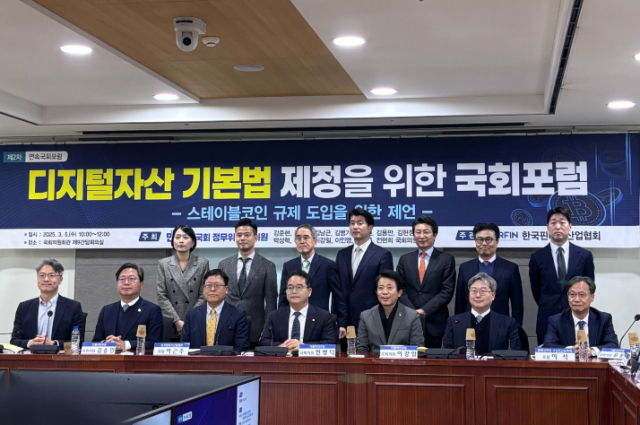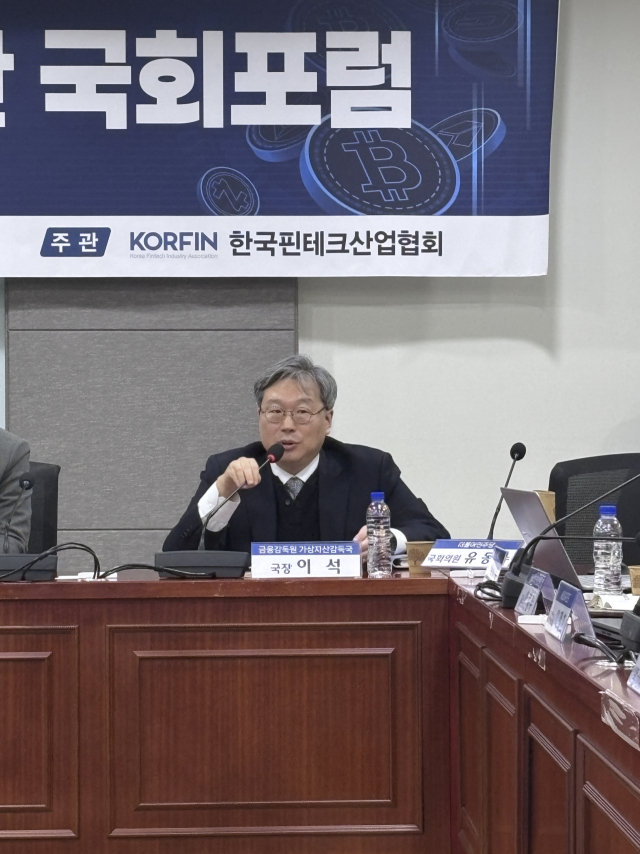
The financial authorities have stated that they are closely monitoring the 'kimchi premium' (the phenomenon where the price of virtual assets in Korea is higher than overseas) of stablecoins traded on major domestic virtual asset exchanges.
At the 'National Assembly Forum for the Enactment of the Digital Asset Basic Act - Suggestions for the Introduction of Stablecoin Regulation' seminar held at the National Assembly Member's Office Building in Yeongdeungpo-gu, Seoul on the 5th, Lee Seok, Director of the Virtual Asset Supervision Bureau of the Financial Supervisory Service, said, "The part we are focusing on is that while the value of stablecoins is clearly pegged to the dollar value, the domestic price is maintaining a higher level than the exchange rate." This event was hosted by a member of the Democratic Party of Korea's National Assembly Political Affairs Committee and organized by the Korea Fintech Industry Association.
Related Articles
- [Morning Briefing] EU Approves 10 Stablecoin Issuers, Excluding Tether
- Fairsquare Labs·KDAC Sign Agreement with Japan's Progmat to Build Stablecoin Remittance Network
- Financial Authorities Accelerate Stablecoin Regulation and Corporate Account Approval
- Logistics Blockchain Project Dicargo Adopts Ripple Stablecoin RLUSD
As of 2:17 pm on this day, USDT was traded at 1,497 won on Upbit and 1,498 won on Bithumb, the top 1st and 2nd largest virtual asset exchanges in Korea. USDT is a stablecoin issued by Tether, a virtual asset pegged one-to-one to the US dollar. At the same time, the won-dollar exchange rate was 1,456 won, meaning USDT was traded about 2.88% higher than the dollar in major domestic exchanges.
The financial authorities attributed the formation of this 'kimchi premium' to the fact that demand exceeds supply. In addition to simple investment purposes, stablecoins are being used for transactions on overseas exchanges and virtual asset arbitrage trading, leading to higher prices.
USDT and other dollar-based stablecoins are used as the base currency in global virtual asset trading. As a result, domestic users who use overseas exchanges are actively utilizing stablecoins to trade virtual assets not listed on domestic exchanges. Accordingly, there is a lot of inflow and outflow of funds between domestic virtual asset exchanges and external exchanges.

Director Lee focused on the external inflow and outflow of stablecoins, saying that "due to their transnational and decentralized characteristics, it is difficult to regulate and supervise this area," but expressed agreement with the need to quickly establish a regulatory system in response to the pro-virtual asset moves of the Trump administration. The financial authorities discussed stablecoins separately along with the 2nd phase legislation in January. They also decided to form an interagency task force (TF) to support the legislative activities of the National Assembly.
Experts also continued to suggest regulations for stablecoins. Kim Hyo-bong, a lawyer at Bae, Kim & Lee LLC, pointed out the need to specifically define the scope of stablecoin regulation, such as domestic-issued KRW, overseas-issued KRW, domestic-issued USD, overseas-issued USD, restrictions on fiat currency types, and other asset-backed stablecoins.
In response, Professor Lee Jeong-soo of the Seoul National University School of Law said, "We need to differentiate between investment assets and settlement assets, and take a conservative approach to stablecoins as settlement assets from the perspective of financial stability," adding that "we should proceed step by step while narrowing the scope."
At the seminar, criticism was also raised about the speed of the current government's virtual asset policy implementation. Rep. Min Byeong-deok of the Democratic Party of Korea strongly criticized the slow pace of the Financial Services Commission's virtual asset policy implementation, saying, "It was 4 months after the Virtual Asset User Protection Act was implemented in July last year that the first meeting of the Virtual Asset Committee was held," and "the speed is as important as the direction in digital asset policy."
Rep. Min said, "At the 3rd Virtual Asset Committee meeting held last February, they said they would allow gradual participation of corporations in the digital asset market, but the trading of digital assets by listed companies or professional investors is expected to be in the second half of this year, and the review of virtual asset ETFs after allowing corporate accounts raises concerns about whether it is in line with global trends," and criticized, "After proposing the tokenized securities system legislation, many experts have contacted and discussed, but the Financial Services Commission has never contacted us, so I wonder if they will just do it on their own."
- Reporter Yeri Do
- yeri.do@sedaily.com
< Copyright holder ⓒ Decenter, Unauthorized reproduction and redistribution prohibited >







